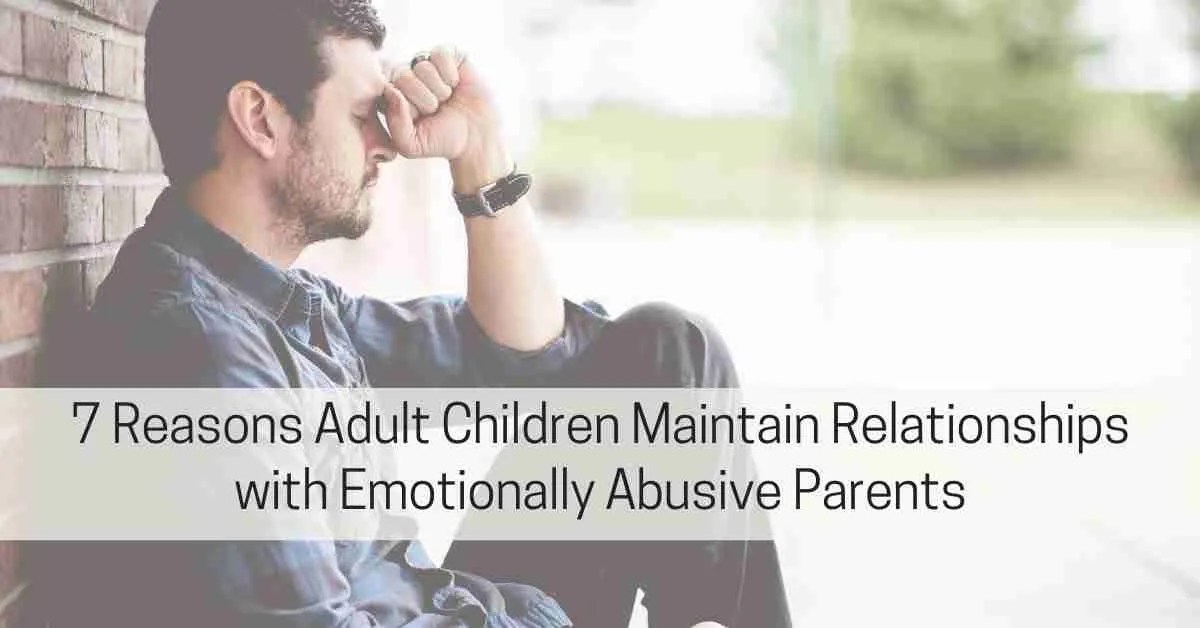Not all parents are nurturing and loving, and some adults continue to endure emotional abuse or mistreatment from their parents. If this is the case for you, you might be wondering why you even bother staying connected to parents who constantly put you down or manipulate you.
Wanting to maintain a relationship with emotionally abusive parents can be confusing—yet it’s completely natural to crave their love and approval, even when you know the relationship is unhealthy.
This article explores some of the reasons why adult children maintain relationships with “toxic” parents.
1) Craving your parents’ love and approval
Humans are social creatures. As children, we rely on our parents for love and security. This need for connection is hardwired into us because our survival depends on it. So, it sticks with us, even when our parents mistreat us.
This desire for connection and approval can be even stronger if you haven’t learned to validate yourself.
2) Hoping that they’ll change
Many of us cling to the belief that our parents will change. You might hold onto hope that you’ll finally get that long-awaited “I’m proud of you” or that they’ll stop drinking or offer a heartfelt apology.
For many, the hope that their parents might change or improve their behavior over time can be a powerful motivator to maintain the relationship. It’s even hard to let go of this hope if your parents occasionally demonstrate kindness, understanding, or interest in you.
Unfortunately, hoping or expecting your parents will change can keep you trapped in a cycle of disappointment.
3) Social pressures to maintain a relationship with your family
Feelings of guilt and a sense of duty can also contribute to maintaining dysfunctional family relationships. Many adult children feel obligated to care for their parents, especially if they believe they owe them for their upbringing. Societal and cultural expectations further reinforce this sense of duty, often placing immense pressure on children to maintain family connections regardless of the circumstances. Distancing yourself can feel like abandoning them, adding to the heavy burden of guilt you’re feeling.
4) Fear of losing other relationships
The potential loss of other family relationships is another reason for staying connected to emotionally abusive parents. The prospect of being alone or losing the support of extended family and friends can lead individuals to tolerate abusive relationships rather than face the uncertainty and loneliness of estrangement.
5) Practical reasons
Practical considerations such as financial dependence or shared responsibilities can also complicate the decision to distance yourself from abusive parents. Adult children who rely on their parents for financial support, housing, or caregiving responsibilities may find it practically impossible to sever ties without significant disruption to their lives.
In these situations, you may find that you need to work on minimizing contact and establishing boundaries while you take steps to increase your independence.
6) Denial, manipulation, and normalization of abuse
When you grow up in an abusive environment, abusive behaviors become normalized to the extent that you may not fully recognize it as abuse. This normalization can make it difficult to see the necessity of distancing yourself from the relationship.
In addition, many abusive or emotionally immature parents are expert manipulators. Abusive parents often downplay their behavior, gaslight, or shift the blame onto their children, creating confusion and self-doubt, which make it difficult for adult children to recognize the extent of the abuse.
Learning about healthy relationship dynamics and the signs of emotional abuse can help individuals recognize the detrimental effects of their parents’ behavior. Distance from the relationship can also provide clarity and help you recognize abuse for what it is.
7) Love, pity, and codependency
Despite the abuse, some adult children genuinely love their parents and don’t want them to suffer. This can make it incredibly difficult to break away if you see love as a reason to tolerate abuse. Furthermore, some adult children excuse their parents’ abusive behavior because of their parents’ unhealed wounds or past traumas.
Codependency can also keep you attached to an abusive parent. Years of abuse can create emotional dependency that makes it difficult for adult children to envision a life without their parents, even if the relationship is harmful.
Implementing boundaries
While the desire to maintain family connections is understandable, it’s crucial to prioritize one’s own well-being. Establishing healthy boundaries is not only a form of self-care but also a way to foster more respectful and balanced relationships. In some cases, this might mean reducing contact or, if necessary, cutting ties entirely to protect oneself.
Seeking support from therapists, support groups, or trusted friends can provide the strength and clarity needed to make these difficult decisions. Remember, it is okay to prioritize your needs and well-being. Distancing yourself from abusive individuals is not an act of betrayal but a necessary step towards healing and self-preservation.
Final thoughts
The decision to maintain or end a relationship with emotionally abusive parents is deeply personal and complex. Throughout the process it’s important to treat yourself with compassion; facing the pain that you’ve endured from emotionally abusive or immature parents is hard and courageous work and requires you to take care of yourself in new and important ways.
©2024 Dr. Sharon Martin, LCSW. All rights reserved. Photos courtesy of Canva.com.
If you’re taking space or estranged from a parent, sign up for free supportive resources.
Read more
Publisher: Source link






